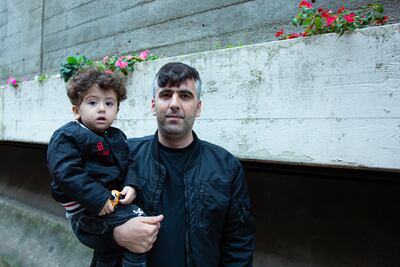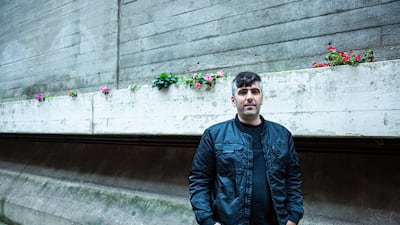Afghans who left their homeland this summer bound for the UK were given the opportunity of a fresh start, but relocation has not banished the mental health demons from decades of conflict.
Basic needs and a safe environment are the most obvious welfare concerns for refugees, but care and concern over their mental health ranks highly as well for many.
The traumatic circumstances of evacuees’ arrival to the UK after the Taliban swept to power in Afghanistan were well publicised. The stress of making it to an airport guarded by troops and being the targets of at least one suicide bomber was an ugly coda to their last days in the country.
For many of those who have recently arrived in the UK “the war has not ended", mental health expert Dr Hana Abu-Hassan tells The National.
The large number of refugees are mostly still living in limbo in temporary hotels, where mental health problems are likely to increase.
“The civil unrest back home, the people they have left behind, the trauma they have lived through is ongoing, be it through social media, the news, being in touch with family,” says the GP at the Chelsea Pharmacy Medical Clinic in London.
For Omran Maroofi, the replay of his last day in Afghanistan continues to haunt him three months later. It was Thursday, August 26, and two suicide bombs ripped through crowds outside Kabul airport killing dozens of people.
Thousands of Afghans desperate to flee their country following the Taliban’s takeover had been waiting in queues that lasted days.
Mr Maroofi was about to board an evacuation flight with his wife and 2-year-old son when the blasts erupted at the Baron Hotel, where Nato officials had been processing credentials to exit Afghanistan.
“I dream a lot about the Baron Hotel, the crowds of people outside the airport trying to get out of Afghanistan,” says Mr Maroofi, in the forecourt of the hotel where he is staying in central London.
The nightmares also plague his wife, who is three months pregnant and keeps asking her husband to take her back to Afghanistan where her parents still live.
“It was a really dangerous time, we saw many things,” he says, his voice trailing off as his mind struggles to recall the disturbing scenes.

Kabul’s airport was at the time the scene of overwhelming chaos and confusion. People waited for days in sewage tunnels to get through the gates, while others reported being assaulted or squashed in the crowds.
Scenes of people hanging off the wings of planes in mid-air, and later of bodies scattered in the bombing, crystallised the extremity of the situation on the ground.
Recognising that many of the Afghans would be arriving with heavy mental and emotional burdens, Hopscotch, a women’s community centre, was quick to push the London council they are based in to adopt a “trauma-informed approach” when dealing with the refugees in their care.
“We understood that as they are the last planes to leave, they're probably going to be the most traumatised, and understanding the pattern of trauma … at that point they would have been in survival mode, but later, they're going to come off survival mode and the trauma is going to hit,” said Hopscotch’s chief executive Benaifer Bhandari.
The organisation has been running an Afghan Refugee Advocacy Project, which includes workshops on life in the UK and language activities, as well as training sessions for any evacuee-facing advocate on trauma-informed practices and cultural awareness.
In close co-operation with the council, Hopscotch and other voluntary community services (VCS) have stepped in to help plug some of the gaps in provisions for Afghans.
Nevertheless, adequate mental health diagnosis and treatment are elusive in the best of cases, let alone where language barriers, a lack of resources and large numbers of people in need are concerned.
In an ideal world, says Ms Bhandari, every family should have a mental health needs assessment and be guided to the services available in the National Health Service and VCS.
“Instead, we as the VCS … have just tried to meet as many needs as possible [but] many have slipped away,” Ms Bhandari says.
After three months visiting the new arrivals, she says the trauma has started coming out, particularly as families struggle to deal with the practicalities and confusion of daily life in a foreign country.
“It really is not a surprise and we are just making sure that our services are meeting some of those worries about the future so that then the trauma can be free to flow,” Ms Bhandari says.
For many, the clash of a tumultuous past and an unclear future is the cause of extreme anxiety.
Mr Maroofi says his parents and in-laws are a major source of worry for him and he sends them whatever money he can from the UK.
“We’re careful with every pound because it means a lot for people in Afghanistan,” he says of an economic crisis in his home country that the UN's World Food Programme has warned could cause half of its population to face acute hunger.
Mr Maroofi says he has not spoken to a healthcare professional about his dreams, in part because he does not know who to speak to and is still waiting to be assigned a caseworker.
“It is very difficult or challenging for an asylum-seeker to say they have a mental health problem, and research tells us that migrants in general use less public health services,” Dr Hana says.
“They’re the type who want to hide away and not cause trouble. They’re normally thankful for anything they receive and feel like a guest, which begs the questions then how much of a home are you really giving them?”
Three months after he landed in the UK, Mr Maroofi and the majority of Afghans are still waiting for somewhere to call home. Instead, he and his family are about to be moved to another temporary bridging hotel two hours away from the one where they have been staying in for the past two months.
“The only reason people have left their houses is to find a safer home. If someone comes and is nomadic again and there’s no guarantee of any future then what does that give them?” Dr Hana asks.
“Anticipatory anxiety” is another issue Dr Hana described while discussing refugees' feelings on the convoluted and opaque processes involved in establishing a new life.
“As refugees we want them to become functional members of society but we are expecting someone to be functional without helping them.”
Mr Maroofi would like to wander around the city a bit more but he is not comfortable using public transport yet as nobody has showed him how.
“We didn’t have trains like these in Afghanistan or proper roads like here and I have problems understanding the maps and the technology used here,” he says.
He would like to continue his studies, having had his university degree in Political Science cut short by the Taliban’s advance, and to get a good job so he can be a “big man” and role model for his 2-year-old son.
There is an “inconsistency in messaging”, Ms Bhandari says, which all the refugees and volunteers find the most difficult and frustrating part of the current ordeal.
“Sometimes we can untangle some of the confusion, but it feels sometimes like a lack of basic human rights when human beings who are in trauma are also left, you know, metaphorically, and probably actually physically, in the dark,” she says.
A government spokesman told The National that the provision of housing and mental health services to Afghan refugees was a priority.
“There is now a huge effort under way to get families into permanent homes so they can settle and rebuild their lives, and to ensure those still temporarily accommodated in hotels have access to health care, education, any essential items they need and employment opportunities, or Universal Credit,” the spokesman said.
“Schools and colleges have access to a range of government support programmes to help children and young people with their mental health. We recently announced more than £17 million ($22.7m) to build on mental health support already available in education settings, including funding worth £9.5m to train senior mental health leads this year.
“We will continue to work with healthcare services to provide front-line support to Afghans as they arrive in the UK through our resettlement schemes, and as part of the resettlement effort.”


